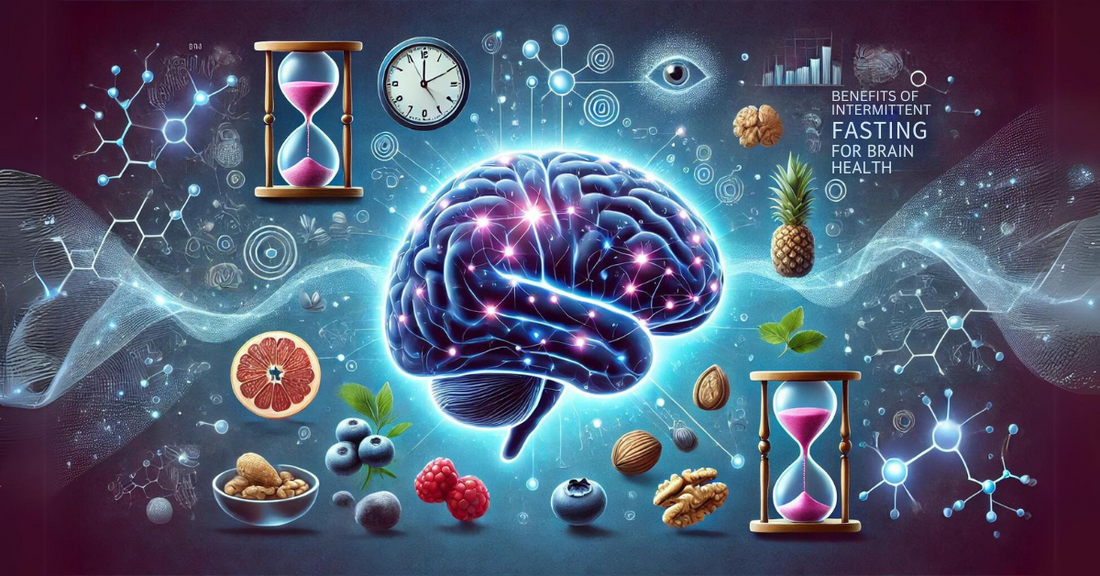
The Benefits of Intermittent Fasting for Brain Health
Share
Intermittent fasting (IF) has gained popularity for its benefits in weight loss and metabolic health, but recent research highlights its profound impact on brain health as well. Beyond helping the body shed excess fat and maintain muscle, intermittent fasting can protect the brain, enhance cognitive function, and even reduce the risk of neurodegenerative diseases. This post explores how intermittent fasting affects the brain and why it may be a valuable tool for maintaining mental sharpness and overall neurological health.
1. Promotes Neurogenesis and Brain Plasticity
Intermittent fasting has been shown to promote neurogenesis, the process by which new neurons are formed in the brain. Neurogenesis is crucial for learning, memory, and overall brain function. Fasting can stimulate the production of brain-derived neurotrophic factor (BDNF), a protein that plays a vital role in promoting the growth and survival of neurons. Elevated BDNF levels are associated with improved cognitive function, enhanced learning and memory, and greater resistance to neurodegenerative diseases such as Alzheimer’s and Parkinson’s .
Research indicates that intermittent fasting increases BDNF levels, thereby supporting neurogenesis and brain plasticity—the brain's ability to adapt and reorganize itself by forming new neural connections. This enhanced plasticity is critical for learning, memory retention, and recovery from brain injuries .
2. Reduces Oxidative Stress and Inflammation
Oxidative stress and chronic inflammation are significant contributors to cognitive decline and neurodegenerative diseases. Intermittent fasting has been shown to reduce oxidative stress by enhancing the body’s natural antioxidant defenses. Fasting triggers the production of antioxidants that neutralize free radicals—unstable molecules that can damage cells, including brain cells.
Furthermore, intermittent fasting can lower inflammation markers in the brain. Chronic inflammation is a known risk factor for Alzheimer’s disease, cognitive decline, and other neurodegenerative conditions. Studies show that fasting reduces inflammatory cytokines, which helps protect the brain from inflammation-related damage .
3. Supports Mitochondrial Health and Energy Efficiency
Mitochondria are the energy powerhouses of cells, including brain cells. Efficient mitochondrial function is essential for maintaining cognitive function and overall brain health. Intermittent fasting has been found to enhance mitochondrial function and increase mitochondrial biogenesis, the process by which new mitochondria are produced.
A study published in Cell Metabolism found that fasting-induced changes in mitochondrial networks increase energy production efficiency and reduce the production of harmful reactive oxygen species (ROS). This improved mitochondrial function supports better brain energy metabolism, which is crucial for optimal cognitive performance and protection against neurodegenerative diseases .
4. Enhances Autophagy and Cellular Repair
Autophagy is a natural process where the body cleans out damaged cells and regenerates new ones. This process is particularly important for brain health because it helps clear out dysfunctional proteins and cellular debris that can accumulate and contribute to neurodegenerative diseases such as Alzheimer’s and Parkinson’s. Intermittent fasting activates autophagy, thereby promoting the removal of damaged cells and supporting cellular repair.
Research suggests that enhanced autophagy during fasting can protect brain cells from damage and improve cognitive function. By facilitating the removal of cellular waste and enhancing cellular repair mechanisms, intermittent fasting may help delay the onset of age-related cognitive decline and protect against neurodegenerative diseases .
5. Improves Cognitive Function and Mood Regulation
Intermittent fasting has been shown to improve cognitive function, including memory, learning, and decision-making abilities. It enhances the production of neurotransmitters like dopamine and serotonin, which are crucial for mood regulation and cognitive performance. Fasting can also increase the release of norepinephrine, a neurotransmitter that plays a role in alertness and focus.
A study conducted by the National Institute on Aging found that intermittent fasting improved brain function, reduced anxiety, and enhanced learning and memory in animal models. The research suggests that similar effects may apply to humans, making intermittent fasting a promising strategy for improving mental clarity, focus, and mood .
Conclusion
Intermittent fasting offers more than just physical benefits; it has profound effects on brain health. From promoting neurogenesis and reducing oxidative stress to enhancing mitochondrial function and autophagy, intermittent fasting supports various mechanisms that protect and improve brain health. Whether you are looking to enhance cognitive performance, improve mood, or protect against neurodegenerative diseases, intermittent fasting may be a powerful tool in your wellness toolkit.
Sources:
- Mattson, M. P., Moehl, K., Ghena, N., Schmaedick, M., & Cheng, A. (2018). Intermittent Metabolic Switching, Neuroplasticity, and Brain Health. Nature Reviews Neuroscience, 19(2), 63-80.
- Longo, V. D., & Panda, S. (2016). Fasting, Circadian Rhythms, and Time-Restricted Feeding in Healthy Lifespan. Cell Metabolism, 23(6), 1048-1059.
- Witte, A. V., Fobker, M., Gellner, R., Knecht, S., & Floel, A. (2009). Caloric Restriction Improves Memory in Elderly Humans. Proceedings of the National Academy of Sciences, 106(4), 1255-1260.
- Youm, Y. H., Nguyen, K. Y., Grant, R. W., & Goldberg, E. L. (2013). The Ketone Metabolite β-Hydroxybutyrate Blocks NLRP3 Inflammasome–Mediated Inflammatory Disease. Nature Medicine, 21(3), 263-269.
- Wilkinson, M. J., Manoogian, E. N., Zadourian, A., Lo, H., Fakhouri, S., Shoghi, A., & Panda, S. (2020). Ten-Hour Time-Restricted Eating Reduces Weight, Blood Pressure, and Atherogenic Lipids in Patients with Metabolic Syndrome. Cell Metabolism, 31(1), 92-104.e5.